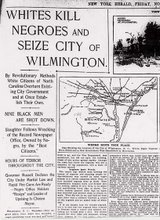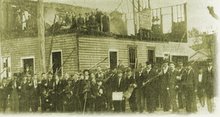In November 1898, the first and only successful Coup D’etat to occur on US soil took place in Wilmington, North Carolina. The local, conservative Democratic Party forcibly toppled the city’s duly elected government, including two African American Aldermen. This treason was perpetrated by high standing citizens and leaders of the community. In a craze of racist fervor, white mobs terrorized the city’s African American community, destroying North Carolina’s only black owned and operated newspaper. While the gang of political thugs burned and looted homes and businesses, hundreds of African Americans were exiled from town, or killed. Many, stripped of their rightfully owned land, never returned home. White citizens were also victimized by this tornado of rage. Members of the Republican Party, Fusionists, progressive whites, or anyone that opposed the re-establishment of white rule and supremacy were targeted. Even President William McKinley’s threat of federal military intervention did not pacify the crowd set on destruction and oppression.
When the fire burned out and the smoke cleared, Wilmington had been transformed. The echoing voice of the African American free press had been silenced and muzzled. The racially integrated downtown business quarter was now white as snow. The thriving African American community, once composed of politicians, attorneys, medical professionals, inspired artists, successful businessmen and optimistic entrepreneurs, now was suppressed and segregated. Freed slaves and the children of freed slaves had proven their worth and humanity through educational and financial achievement. Now they were on par with their former slave-masters, competing with white society, only to be bashed back down through the use of violence and intimidation. The promise of freedom, justice, equality and the American dream had finally been realized by the African American community in Wilmington, only to be aborted in a premature demise. In a suicide-like obsession, the city had turned against itself. A fratricide reminiscent of Cain and Abel had occurred in Wilmington, North Carolina.
Malcolm X explained, “You don't stick a knife in a man's back nine inches and then pull it out six inches and say you're making progress. [Nor] can you pull it out all the way and say you are making progress, [because if] you jerked the knife out, it's still going to leave a scar!”
Now, over 100 years later, we find Wilmington a racially separated city with a definitive socio-economic disparity. What effects did the 1898 race riots have on the condition of the community today? Are there any scars left on the back of the African American community of Wilmington? What steps must be taken to heal these wounds? The State Democratic Party is debating a formal apology. There are project proposals to build a memorial and talks of lawsuits and reparation cases. What are the steps needed to be taken to right our past wrongs? These are the questions we wish to investigate in our UNCW Film Studies Documentary Course throughout the semester.
skip to main |
skip to sidebar

Abandoned building reminiscent of rioting



still photo

Abandoned building reminiscent of rioting
New York Herald

Race Riot
